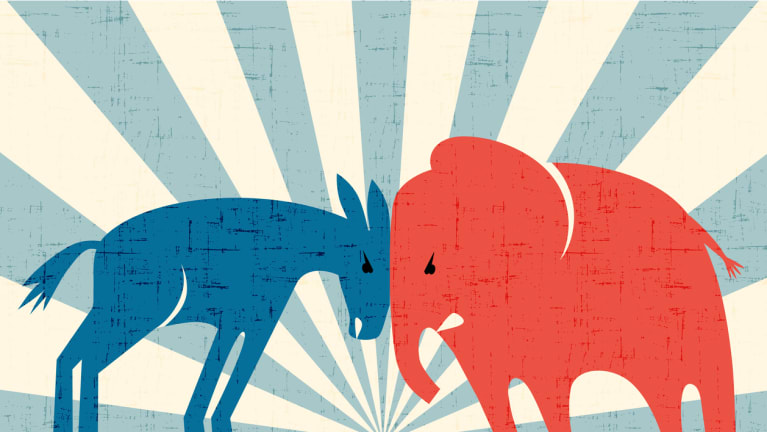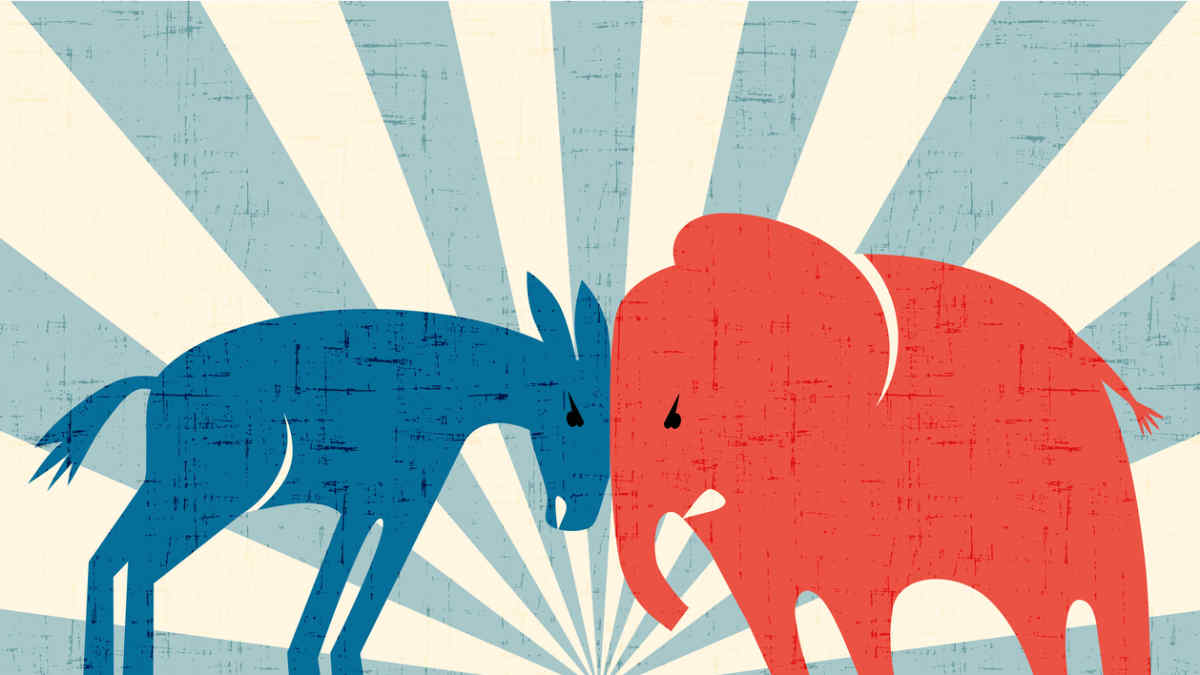

?It’s not uncommon for differing political views to cause angry arguments or even physical altercations at the workplace. These political disagreements tend to heat up in a presidential election year.
“We’ve got the 2024 election right around the corner. The talk is going to pick up again. You’re going to get arguments in the workplace,” Kelly Dobbs Bunting, an attorney with Greenberg Traurig in Philadelphia, told attendees during a concurrent session at the SHRM Annual Conference & Expo 2023 on June 12. “All of this is becoming far more relevant because employees speak up more than they used to speak up.”
As an example, Dobbs Bunting recalled widely circulated photos of a Virginia cyclist giving the middle finger to then-President Donald Trump’s motorcade in 2017. “She wasn’t at work. She was riding her bike, and she was expressing her political view,” Dobbs Bunting said, but she was fired from her job at a government contractor. She sued for wrongful termination but lost in court, partly because Virginia’s at-will employment laws don’t cover free speech.
HR professionals need to understand federal and state laws that govern when an employer can or can’t discipline or fire someone for political diatribes that might be offensive, profane, harassing or discriminatory.
Under the Hatch Act and Civil Service Reform Act, public employees have some free speech protections “if they are not engaged in their official duty,” Dobbs Bunting said. Unlike public employees, “private employees have very few speech rights,” she said. “People often confuse those two things.”
Sometimes other misconduct happens alongside the offensive speech, and employers can discipline or fire someone for that misconduct, rather than the speech.
“Think about the Jan. 6 attack on the Capitol. Many of those folks were fired. They were fired not because of their speech, not because of what they believe in, but because of the criminal activity, because of the trespassing, breaking and entering, and assault,” Dobbs Bunting said.
Violating Corporate Policy
Many companies have written policies and codes of conduct that spell out what employees cannot do on email and social media. If speech devolves into harassment or discrimination, that’s typically a violation of company policy and the employee can be subject to discipline or firing. Company policies should include language that prohibits conduct that disrupts the workplace, Dobbs Bunting said.
“Apply those policies evenly” to all workers, Dobbs Bunting advised. Otherwise, you could face discrimination or retaliation allegations.
Sometimes workers attend political rallies or support political beliefs that go against the employer’s stated values and mission. In deciding whether to discipline or fire someone, consider whether the conduct happened while off duty and whether the conduct harmed the company’s public reputation.
Political expression while off duty and outside the workplace may be protected, if it doesn’t violate a corporate policy or disrupt work. Some states have laws protecting certain kinds of political expression or any type of legal activity while off duty.
“Some of these off-duty laws are written so broadly,” Dobbs Bunting said. “You don’t want to be the test case in court that figures out how broad that law is.”
It makes a difference if the employee makes known their employer’s name or logo. “If he’s out there waving around the federal agency that he works for, or he’s in the T-shirt or whatever, that’s a problem because it looks like the government is supporting what he’s saying,” Dobbs Bunting said. “Don’t drive the truck with the logo on it to the rally.” The same applies to private employers.
Conduct by a supervisor is different than conduct by subordinates. “If you’ve got a manager saying stuff or doing things online, and the direct reports notice, you must take action” to investigate, Dobbs Bunting said. “You have to take action because that manager speaks on behalf of the employer.”
“Even though you might think that’s not political at all, other employees will,” she added. “Consider all the facts. Don’t act on emotion. Think about what the impact your decision is going to be on your workforce.”
Union Activity
Based on a May 1 ruling from the National Labor Relations Board, it’s now harder for employers to discipline or fire workers who display offensive conduct while engaged in concerted activity protected under the National Labor Relations Act (NLRA). The ruling permits some offensive conduct that occurs while employees are engaged in concerted activity, like picketing or union negotiations or publicly complaining about workplace conditions.
“Respectful workplace policies are kind of on the firing line again,” Dobbs Bunting said. However, speech is not protected if its “maliciously untrue.” Furthermore, the NLRA does not protect employees who complain about a customer of their employer.
“It has to be about a term or condition of employment. It can’t just be some wild idea, but that’s where we get into trouble because it starts blending together,” Dobbs Bunting said.
